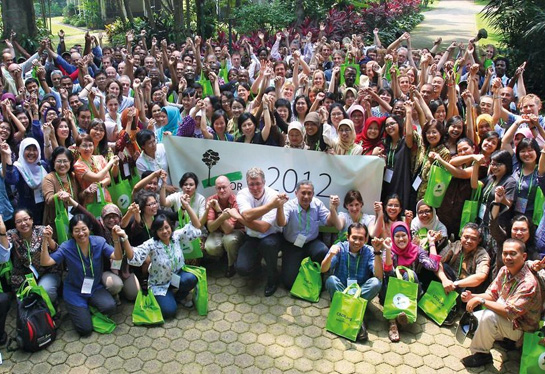
Center for International Forestry Research

Finance and HR: Supporting science and CIFOR’s growth
CIFOR’s growth has been in the double digits for the past six years and the organisation has doubled in size over the same period.
For 2013, the budget is estimated at $44 million, up from $33.8 million in 2012. Per annum growth for 2012 was 20 percent and is expected to increase to 30 percent in 2013.
The Finance and Administration team is one part of this growth story, putting in place policy and procedures to strengthen accountability, assisting with proposals and budgeting and supporting the expansion of CIFOR’s research into new regions.
Kumar Tumuluru, Director of Finance and Administration, noted, “We have been consistently checking the budgets to make sure they reflect what the scientists are doing on the ground, making sure our donors are happy with the budgets, making sure all our expenditures are in order from different parts of the world and ensuring that our audits are clean audits.”
The volume of restricted funding has also been increasing over a number of years, so finance staff have been working to produce proposal budgets side by side with scientists, Tumuluru said.
Moving into the era of CGIAR Research Programs, where CIFOR is the lead on the Forests, Trees and Agroforestry program, has meant that the finance team has also become responsible for funds for other research centres. They were also a critical part of the team that created the program’s proposal, which was well received by donors.
The finance team has supported a number of audits and studies, such as the four-pillar assessment by the European Commission, CIFOR’s single largest donor. The audit results meant that CIFOR was classified as an international organisation by the Commission. Says Tumuluru, “It means we can follow our own policies and procedures, not theirs, which leads to a significant cutback in administration costs.”
Working closely with finance, the administration team ensures that CIFOR’s campus and infrastructure is maintained to international standards to create a safe working environment for all.
Finance and administration staff in the regional offices also ensure all policies and processes are implemented effectively and support the headquarters based teams.
The Human Resources (HR) team has also had a critical role to play in the expansion. Staff numbers have increased in line with the organisation’s growth, rising from 183 staff in 2010 to 206 by the end of 2012.
“In this dynamic environment, the HR team has had to review the compensation and benefits package in order to become a more attractive employer. The new package, implemented in 2010, has been reviewed and further streamlined and has now been formalised,” said Liza Moore, Director of Human Resources. “The improved benefits package works hand in hand with other efforts to recruit scientists, such as improved information about living and working at CIFOR’s headquarters in Bogor, Indonesia.”
This year, CIFOR also increased its presence in Southern and Eastern Africa by establishing a regional office in Nairobi, Kenya, with the support of HR. The HR team also reviewed the organisation’s staff manual, approved by the board in May, to streamline documentation and policies.
In another big achievement for human resources and diversity, the gender ratio at CIFOR is now nearly 50-50.
“We are not having problems attracting female scientists,” Moore said. “Going forward, our focus on gender equality will shift to try to gain more gender balance at the managerial level.”
